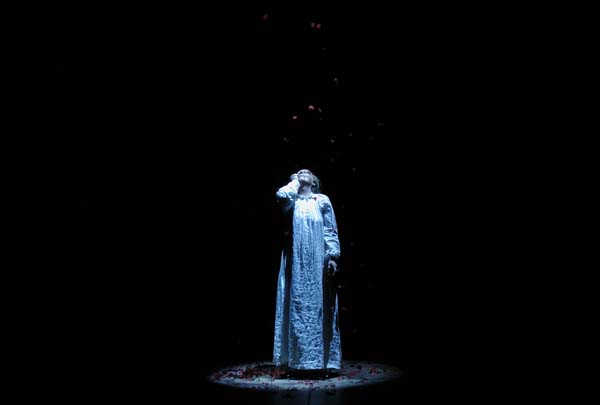 |
 |
 |
 |
 |
 |
 |
 |
 |
 |
 |
 |
|
|
|||||||||||||||
|
|
|||||||||||||||
|
|||||||||||||||
|
|
|||||||||||||||
Graduate Lighting Design THEA649B
Professor: David Jacques
Office Telephone: 985-4044
Office Hours: Mon/Wed 10:00-11:00
Class Times: Thursday 8:00-12:00
Location: Star Chamber
E-Mail: djacques@csulb.edu
Web Page: http://www.davidmartinjacques.com
Course Objective and Outcomes:
The student will:
1. Learn and apply the fundamentals of learning how to see, exploring the
mind's eye, and painting with light.
2. Learn to translate theatrical moments and dramatic music into lighting
sketches, storyboards, and atmospheres.
3. Learn transition and cueing techniques.
4. Learn to develop points of view and design approaches.
5. Learn the fundamentals of the tools of the lighting designer.
6. Understand proper preparation for the theatre, production techniques,
and assistant skills.
7. Learn and practice industry standard lighting designer and assistant
designer procedures.
8. Learn and practice lighting visualization programs (WYSIWYG and Vision)
and Automated Lighting Control
Requirements:
The student is expected to attend all classes and special seminars.
Projects turned in after the due date will not be accepted unless for compelling
reasons.
Exam and project dates are subject to change.
LIGHTING JOURNAL - The student is expected to construct an on-going daily
lighting journal containing photographs and other visual images collected
by the student. In addition, this journal must include daily comments on
what the student has discovered in the lighting design process. These discoveries
should originate from the student’s own observations of their work,
their colleagues’ work, and observations of professional designers’ work.
It is expected that these comments be thorough, graduate-level explorations
of lighting design techniques. This journal will be presented to the professor
at the end of every month.
Class Projects:
Project 1: :POV Issue Project
Project 2: Vision/Hog PC Music Project
Project 3 - Architectural Space Project
Project 4: TBA - Guest Master Teacher Project
Project 5 - A Little Night Music - Cue List and Photoshop Storyboards
Project 6 - Design Exhibition Installation/Light Art Project
Projects turned in after the due date will not be accepted unless for compelling
reasons.
Exam and project dates are subject to change.
Evaluations:
The student will be evaluated on six class projects (60% of the final grade).
The student will also be evaluated on their practical lighting assignments
for the Department of Theatre Arts and their applicable production book(s)
(20% of the final grade). Production books for these assignments are due
one week after the production opens. The remainder 20% will be evaluated
on the lighting journal (due on May 12, 2011). The teacher may request to
look at the status of the lighting journal at any time during the semester.
Project 1 = 10%
Project 2 = 10%
Project 3 = 10%
Project 4 = 10%
Project 5 = 10%
Project 6 = 10%
Production Book = 20%
Lighting Journal = 20%
Attendance: Students are expected to attend all classes and special events.
Strict adherence to the CSULB attendance policy will be followed. If attendance
problems occur the student will be notified in writing (via email) of the
ramifications of the student’s absences. Excessive unexcused absences
will result in the student being dropped from the class or in a grade of “F” for
the class.
Computers and Digital Devices Used in Class: No computers or digital devices
are permitted to be used in class unless these devices are being used at
that time to present the student’s work. If the student requires
these devices for medical and/or learning disabilities, then exceptions
will be made.
Distance Learning Experiences: Distance Learning software such as Elluminate
and Skype may be used from time to time to bring real-time worldwide professional
experiences into the classroom. This may include graduate teaching sessions
conducted by the professor from remote locations. These sessions may be
held during regular class times.
In addition, students may accompany the professor on external projects
nationally and internationally. It is the students' responsibility to obtain
all necessary travel documents, insurance, and any other travel requirements
from their university, country of residence, and country to be visited.
Materials:
Digital Camera
Software:
ESP Vision
LightWrite
Vectorworks Spotlight
Texts:
A Little Night Music, Musical
The Power of Myth, Joseph Campbell (Available at Bookstore)
A Practical Guide to Stage Lighting – Shelley (Available at Bookstore)
Various Essays and Articles, Jacques (located on website: www.csulb.edu/~djacques/)
Website: www.davidmartinjacques.com
All of Professor Jacques’ essay assignments along with his complete
PowerPoint lecture presentations are located on the website. Make sure
you have a fast connection to view the PowerPoint presentation.
Course Outline:
1. 1/27 Introduction and Class Structure – Choose Song for Vision Music Project
2. 2/3 Project 1 - POV Issue Project - Research
3. 2/17 Project 1 – Presentations and Critiques
4. 2/24 Project 2 - Vision/Hog PC Music Project – Vision Set Design
Due - Programming
5. 3/3 Project 2 – Vision/Hog PC Music Project - Final Presentations
5. 2/24 Project 3 – Architectural Specifications and Standards
6. 3/3 Project 3 – Architectural Research
7. 3/10 Project 3 – Preliminary Plot Due – Red-mark Plans
8. 3/17 Project 3 – Final Plans and Specification, Fixture Specification
Sheets, Hookup
9. 3/24 Guest Master Teacher – Project 4
10. 4/7 Guest Master Teacher – Project 4
11. 4/14 Guest Master Teacher – Project 4
12. 4/21 Project 5 - Designing the Musical: Understanding and Following
a Score
Research Due
13. 4/28 Project 5 - A Little Night Music: Music Study and Cue List Due
14. 5/5 Project 5 - A Little Night Music: Photoshop Storyboards Due
15. 5/12 Project 6 - Design Exhibition Installation Project
16. Finals - Project 6 - Design Exhibition Installation/Light Art Project
